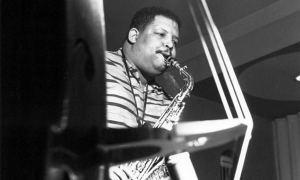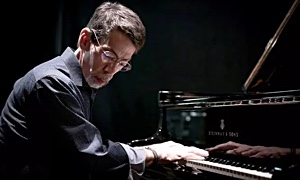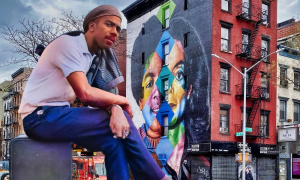Home » Jazz Articles » So You Don't Like Jazz » Baby Steps to Giant Steps
Baby Steps to Giant Steps

Rogan remarked, 'You're either into jazz or you're not into jazz, and like I've never liked jazz—I like it as background music...'
Today's column focuses on Joe Rogan, one of the most influential people on the Internet. He is a stand-up comedian, television actor/host, color commentator for mixed martial arts, and the host of a wildly popular podcast which recently resulted in a purported $100,000,000 deal with Spotify. Clearly we won't have a chance to turn Joe Rogan on to jazz, but nothing is stopping us from engaging in a thought experiment about how we could go about it.
Last year on his podcast there was an interesting exchange between Rogan and David Lee Roth, the lead singer of the band Van Halen. Rogan remarked, "You're either into jazz or you're not into jazz, and like I've never liked jazz—I like it as background music..."
David Lee Roth did a commendable job defending jazz. His approach was to equate jazz with the finer things in Rogan's life which require cultivated tastes to truly appreciate— things such as Cuban cigars, Scotch whisky and Kentucky bourbon. He also used an analogy of a good technical boxing match versus a slug fest. To the untrained eye, a technical boxing match might seem boring compared to a slug fest, but with knowledge comes appreciation. Lastly, he used a comparison of Paul McCartney and John Lennon, McCartney being happy and upbeat, and Lennon being wistful and melancholy. He then used that to explain Thelonious Monk "the right hand is Paul, the left hand is John, and he's working this thing and you can't tell if it's happy or sad."
How to Start
Let's stipulate, it's highly unlikely you could change Joe Rogan's mind without exposing him to jazz. Ideally you'd connect jazz with a few important aspects of his life. The first thing you might focus on is the fact that he is a stand-up comedian, and then point out the connection between comedy and music. That's especially true for jazz given its emphasis on improvisation. Beyond improvisation, both also rely on things like timing, rhythm, dramatic pauses, changes in volume, and of course the most important aspect of comedy, the power of the surprise when delivering a punchline. An unexpected way of approaching something is the hallmark of great comedians and jazz musicians—tip of the hat to Thelonious Monk, the master of the unexpected. (this was discussed in my interview with John Scofield)I Don't Like (fill in the blank)
The point needs to be made that broad sweeping statements about jazz as a monolith are meaningless—as would be lumping together all stand-up comedians. For example, Carrot Top, Larry the Cable Guy and George Carlin are examples of successful stand-up comics. Yet would seeing any one of them give you any indication about whether you would like the other two? Obviously not. The same would hold true for rock guitarists Buddy Holly, Jimi Hendrix, and Kurt Cobain, or any number of jazz musicians.Drilling down a little on George Carlin, you might point out that if comedy were music, George Carlin had jazz chops. Plenty of comedians can make you laugh, but Carlin's comedy was complex, precise, and built upon a masterful command of the English language. Yes, he made the audience laugh, but he also made them think—he entertained and informed audiences with penetrating wit and insight. The goal would be to help Joe Rogan recognize that great jazz musicians possess skills sets which, to a certain extent, mirror those of stand-up greats like Richard Pryor and George Carlin.
Shared Skills
Next, because of his martial arts background we could also highlight the similarity between the training of a martial arts master and a jazz master. Martial arts require intense practice, heightened mental focus, extraordinary physical coordination, and split second reactions— traits also present in jazz masters. Thus in the case of Joe Rogan, not only can we connect jazz artistry with the intense training associated with martial arts, but also with the rhythm, timing, and improvisational skills of a comedian.Beyond that, stand-up comics see themselves as a rare breed of entertainer with the skill and confidence to stand alone in front of an audience and entertain—they kill, or die on stage. There are, however, some jazz musicians who do this too. Barbara Dennerlein would be an ideal example. Her skills are unmistakable, they also require a high degree of physicality, and she often performs solo. Lastly, the fact that she's European and female helps to dispel stereotypical assumptions about jazz and the people who play it.
We could start with a clip of her in a duo formation—pointing out that she is playing the walking bass lines with her left foot, controlling the volume with her right foot, soloing with her right hand, accompanying herself with her left hand, all the while working the controls of the Hammond B3 and the integrated midi system (which she pioneered.) Finally, we could ask him to imagine the physical stamina required to play foot bass like that for a couple of hours, while maintaining hand-in-glove coordination with a drummer.
Hendrix Connection
Rogan has a poster of Jimi Hendrix's mugshot hanging in his studio, so he's clearly a serious fan. With that in mind, we might expose him to a couple of clips of guitarist Hiram Bullock. He was once the barefoot guitarist in David Letterman's band, so it's possible Rogan might remember him from that. Bullock was at home with jazz, rock, funk, soul, and rhythm & blues, and brought a Hendrix-like rock energy and attitude to much of what he played. This jazz definitely isn't background music.Voice and Adaptability
The next clip features Brazilian singer/songwriter/guitarist Djavan, with Hiram Bullock in a supporting role. In 1990 on the network television show Night Music Djavan was backed by David Sanborn sax, Marcus Miller bass, Hiram Bullock guitar, Omar Hakim drums, Don Alias percussion, and Philippe Saisse keyboards.This clip allows us to transition to the seductively beautiful music of Brazil and subtly draw attention to the global reach of jazz. It also demonstrates the power of jazz musicianship—check out Don Alias' powerful solo, and Djavan's reaction to Bullock's backing.
Full Circle
Probably the most important aspect of Joe Rogan's life would be the fact that he is a father of three young daughters. For that reason I would close out my appeal to him by exposing him to the Sant Andreu Jazz Band which was founded in 2006. This remarkable band was the brainchild of Joan Chamorro, a multi-instrumentalist jazz musician employed as the music teacher of a municipal school in Barcelona, in the Catalonian region of Spain. By 2012 the project was too big for the school and became an independent entity.His direction and teaching philosophy have garnered worldwide attention, indeed he would make for a fascinating guest on Joe Rogan's podcast. His band is organized as a family, and music is taught to the children as a language. Just as with the mother tongue, learning the language of music is treated as something natural—learning to read and write comes later after students achieve some degree of fluency. For the first couple of years they sing and dance, listen to music, and strive to play with their instruments the melodies they can sing. Eventually, they begin to naturally express their feelings in the language of music.
The results are extraordinary. These young musicians have shared the stage with several prominent jazz musicians, and their videos have millions of views. These three clips allow us to follow the development of Alba Armengou, a vocalist, trumpeter, and saxophonist, at ages 15, 14, and 10.
As a father, Joe Rogan would no doubt be impressed by these young people's passion, dedication, and love for music. Perhaps after witnessing their unmistakable joy when playing jazz, he might admit that his contention, "You're either into jazz or you're not into jazz, and like I've never liked jazz" was a bit too hasty. Clearly, if a love of jazz was latent in these kids in Barcelona, it is latent in him. He might someday agree that this is a more accurate statement, "You either give jazz a chance, or your don't, if you do, you'll find some things you like—but as with rock and pop, you won't like everything."
Photos by Jorge Fakhouri Filho
Tags
So You Don't Like Jazz
Alan Bryson
Thelonious Monk
Jimi Hendrix
Barbara Dennerlein
Hiram Bullock
Djavan
David Sanborn
Marcus Miller
Omar Hakim
Phillipe Saisse
Joan Chamorro
Alba Armengou
Sant Andreu Jazz Band
Joe Rogan
About Barbara Dennerlein
Instrument: Organ, Hammond B3
PREVIOUS / NEXT
Support All About Jazz
 All About Jazz has been a pillar of jazz since 1995, championing it as an art form and, more importantly, supporting the musicians who make it. Our enduring commitment has made "AAJ" one of the most culturally important websites of its kind, read by hundreds of thousands of fans, musicians and industry figures every month.
All About Jazz has been a pillar of jazz since 1995, championing it as an art form and, more importantly, supporting the musicians who make it. Our enduring commitment has made "AAJ" one of the most culturally important websites of its kind, read by hundreds of thousands of fans, musicians and industry figures every month.
























